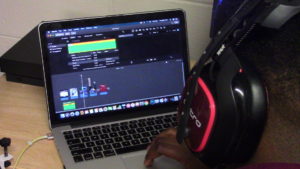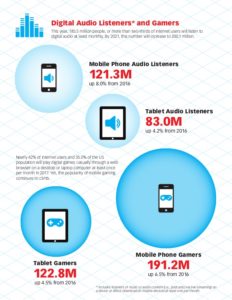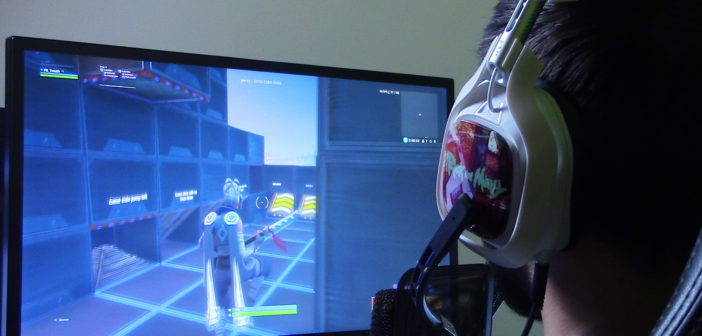With a level playing field, a major question arises. Do people try to get into digital media for the money or is it just for fun?
In 2017, digital media viewers increased to about 221 million. That is a 3.1 percent increase from 2016.
Scholars Max Sjöblom and Juho Hamari conducted a study to figure out why millions watch digital media.
In their study, Sjöblom and Hamari discussed how there are five motivations for one to watch digital media. One of these motivations was tension release. Tension release is the strongest positive predictor when it comes to how many hours one spends with digital media.
Tension release is a logical motivation to view digital media. However, not everyone would think there are motivations behind viewership. One would be North Central student and YouTuber Zach Robinson, ’22.
“I feel like our generation, especially, is so into Youtubing and digital media just because we grew up with it,” said Robinson. “It was kind of like, ingrained into us.”
Robinson posts videos on his channel, A THRU Z. The reason Robinson made his YouTube channel ties in with how many individuals are now engaging and watching videos on that platform.
“I kind of made my YouTube channel to make people have something to watch,” said Robinson. “Everybody always needs something to reach out to. So, I feel like that’s kind of the main reason I made my YouTube channel because everyone needs that outlet.”
So, what are Robinson’s intentions in the long run?
“If I do get big enough to make money then yes, I would make money,” said Robinson. “But I’d still do it for fun. I wouldn’t lose that side of me, like wanting to do it for fun and wanting to make people laugh.”

The current setup that Tyler Espino uses to create his digital media content.
Millions of viewers are engaging with digital media. With an audience there, the focus shifts to the digital media content creators themselves.
Content creators have motives explaining why they got into digital media, but their motives might not be as complex as one might think. Scholars Ben Light, Marie Griffiths and Siân Lincoln played with the idea of “vernacular creativity” in their research. These scholars coined this term as a “way of describing and surfacing creative practices that emerge from non-elite, specific everyday contexts.”
Digital media gives everyone a chance to express themselves in a creative manner. There is no norm to follow; the creator can express what they want. That is what NCC student and Youtuber, Princess Adams, ’21, did.
“I think it’s more like my personality type,” said Adams. “Day-to-day I’m a little over the top. Sometimes I can be a little overdramatic and I think the world needs to see it.”
Adams has been able to use her vlog channel, Princess Talks, to express her personality and thoughts for viewers to see. However, this isn’t the only reason that Adams got into Youtubing.
“Because I’m a marketing major, I like the idea of creating this image that people fall in love with,” said Adams.
Scholars Jean M. Twenge, Gabrielle N. Martin and Brian H. Spitzberg would appreciate Adams’ logic on using her YouTube channel for marketing, especially since they believe that digital media is on the rise.

Davin Allen working in iMovie to edit his digital media content.
These scholars concluded in their digital media study that the current generation has spent much more time with digital media. Certainly, this rise of engagement has been due to the release of smartphones and high-speed internet.
With digital media more popular than ever, it makes sense why someone would want to venture into media. With popularity at a high, this means there are more opportunities for revenue-making. Even with the higher chance for revenue, Adams wouldn’t say money is her real reason for making YouTube videos.
“My goal is for fun,” said Adams. “I’ve seen some people say that it turns into a job that they are not enjoying anymore.”
Scholar Ciro Scardina sees the purpose of digital media, especially in podcasting, is to tell a story.

Digital media audio listeners are increasing at a steady pace. Photo courtesy of slideshare.net
Telling a story gives an audience a chance for interpretation. A chance for understanding their subject. It’s a tool for expression. North Central Alumnus and Podcaster Jack Bronec, ’19, agrees with this.
“There are different podcasts for different kinds of people,” said Bronec. “You could find literally a podcast for anything. If you have an interest, there’s probably a podcast.”
Bronec has been the host of a podcast called “Hot Takes with Jack” since March of 2018. With his podcast, Bronec has been able to express his thoughts regarding sports. Since podcast listeners can consume the media in a multitude of ways, the amount of content within podcasts is increasing. This includes advertisements, as the amount of advertising within digital media is increasing.
“As advertisers see people not going to TV and going from old to new marketing taxes, they are going into more of social media,” said Bronec. “You’re going to see more Twitter ads, YouTube ads. A lot of people are not going to want to pay for YouTube Red, the whole 10 bucks a month, so they’re willing to spend five seconds on an ad and that’s a lot of viewers (on an ad).”
The chances of making revenue through advertising in one’s digital content are there. That doesn’t mean that changes Bronec’s original intentions.
“I’m just doing it for fun,” said Bronec. “I’m technically making money, but it’s like two dollars here and there.”

Using microphones in digital media provides clear audio that makes listeners want to continue hearing on.
Whether it’s Youtubing, podcasting or any other form of digital content, digital media performs as a source of innovation. Scholar Richard Berry said he sees digital media as a platform of a “wider ecology of digital participatory practices.”
Digital media is evolving constantly. It gives new and creative ways for one to express themselves. Assistant Director of Student Involvement and Podcaster DuShaun Branch said this is true, especially in terms of podcasting.
“(It is) absolutely (an outlet for expression),” said Branch. “I listen to so many different podcasts and it just gives people platforms to tell their stories, to learn different perspectives, to educate you.”
Starting in the summer of last year, Branch has hosted her own podcast, Squeezin’ Lemons, to talk about many different aspects of life with her friend, Dr. Ginger Jacobson. Branch can express herself digitally and she has intentions of keeping it that way.
“I don’t know if I’m necessarily in it for the money,” said Branch. “I think for me it’s really just the fun and the conversations and to just have something out there that we’ve created ourselves that you can find on iTunes. That’s what I really enjoy about it.”

